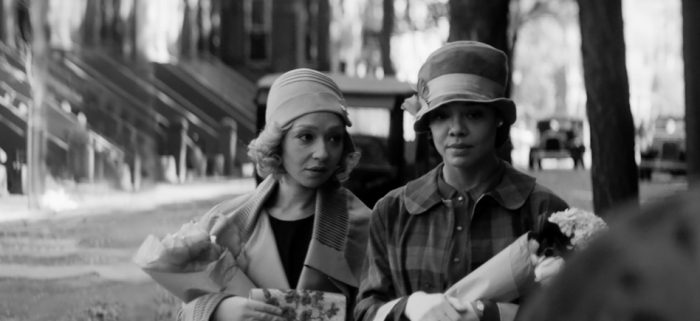‘Passing’ Review: Tessa Thompson and Ruth Negga Deliver Exceptional Performances in Rebecca Hall’s Directorial Debut [Sundance 2021]
Irene (Tessa Thompson) and Clare (Ruth Negga) meet in the restaurant of a posh New York hotel, spotting each other from across the room. Irene mistakes Clare for a stranger at first, but as it turns out, the women grew up together. But as Irene looks Clare over during this reunion, she can hardly believe her eyes. Clare is sporting platinum blonde hair, and for a moment – just a moment – Irene thought she was white. But both women are Black – although they can hide it. Both are light-skinned enough that they can, if they want to, pass for white. It’s something we see Irene do briefly at the start – and she doesn’t seem very comfortable doing it, constantly hiding behind her own hat and avoiding eye contact whenever possible. But for Clare, passing has become a way of life. She even has a white husband (Alexander Skarsgard). “Does he…?” Irene asks, before Clare cuts in: “Know?” He doesn’t.
Rebecca Hall‘s Passing, adapted from the 1929 novel by Nella Larsen, follows these women across an ever-shifting timeline. It’s not entirely clear how much time passes, because Hall lets the days all crash into each other, and we only know significant time has passed when characters throw out a line or two signaling something that’s changed. It lends the entire movie a dreamy quality – as does the gorgeous black-and-white (and sometimes almost monochrome) cinematography from Eduard Grau. When Irene and Clare meet in that hotel restaurant, the scenery around them is stark white – the walls, the floors, the tablecloths, even Clare and Irene’s clothing take on the color of freshly fallen snow.
Dealing with race, gender, identity, and sexuality, Passing is a film about characters unable or unwilling to admit who they are. Clare happily lives the life of a white woman and even laughs off her husband’s unflinching racism (he calls her the n-word as a term of endearment in one of the movie’s most unbearably tense scenes). And yet she frequently talks about returning to Harlem, where Irene lives, to live among Black people again. Irene, in contrast, says she’s happy being who she is. Sure, she can pass if she really wants to, but she says she doesn’t want to. On top of that, she says she’s furious with Clare for her continued charade. But whenever Clare comes around, Irene can’t help but look at her longingly. She lusts for Clare, both sexually and with envy. Clare is free and happy in ways Irene can’t imagine, and there are multiple moments where all Irene can do is stare. Stare with both confusion and passion. At one point, the camera – from Irene’s POV – rests on Clare’s bare skin when the woman is wearing a backless dress, and Irene is seized with the sudden urge to reach out and touch her friend’s hand.
Irene isn’t alone in her longing. Everyone seems to be smitten with Clare, including Irene’s sons and her husband, Brian (Andre Holland), a doctor who wants to leave America and live abroad rather than raise his children in such a racist country. It’s the type of talk Clare doesn’t want to hear, and when Brian attempts to tell their children about a Black man who was lynched, she hushes him, saying the boys don’t need to know about that sort of thing right now.
Thompson and Negga are transcendent in their respective roles. Negga’s Clare gets to have more fun, and since the film is told entirely through Irene’s POV, Clare remains something of a mystery to us just as she does to Irene – we don’t really know what’s going on in her head. But Negga gives us hints through silent, weighted glances that seem to say so much without saying anything. Thompson, in contrast, is a bundle of nervous energy. She adopts an almost Mid-Atlantic accent to make the character seem extra-propper while playing Irene as someone so rigid that she might crack. Thompson has continually turned in memorable work but this might be her finest performance to date.
Passing eventually builds towards an ending that feels both inevitable and rushed, and the conclusion – while emotional and stark – robs the film of some of its power. It’s almost a shrug, as if the story gave up on itself, and I wanted just a little bit more. But the dreamy images and the simmering passions of the film lingered with me.
The sorts of themes Passing is trafficking in could easily go wrong on the screen if they were approached in an unsubtle, heavy-handed way. But Hall, who makes her feature directorial debut and also adapted the script, deftly balances it all. There are no big outbursts, no speeches. Everything is just slightly beneath the surface, simmering. We know it can all boil over at any moment, and that lends the entire movie considerable tension. It’s as if we’re waiting for the other shoe to drop; for something to go horribly, irreconcilably wrong. Occasionally, Hall gives in to some flourishes that distract from the story she’s telling her, such as several shots where characters deliberately go out-of-focus. And the decision to shoot the movie in 4:3 aspect ratio at times feels like a distraction. For the most part, though, this is a strong debut, proving that Hall is not just a great performer but on the way to becoming a great filmmaker, too.
/Film rating: 8 out of 10
The post ‘Passing’ Review: Tessa Thompson and Ruth Negga Deliver Exceptional Performances in Rebecca Hall’s Directorial Debut [Sundance 2021] appeared first on /Film.
from /Film https://ift.tt/3j10rZ6
via IFTTT

Comments
Post a Comment